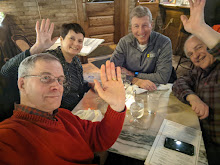
It was Father's Day today and the tributes to dads across social media can make a lesser mortal believe he could never be a halfway decent father. How could anybody live up to these testimonials?
Here's a secret, kids: we were just winging it. We'd never been fathers before and, sure, we learn a lot about being a father by our fathers but when we're young, we have only one goal: not to be our fathers.
And then kids come along and right around the time we think we could write a parenthood book, our kids turn into, well, the kids they're supposed to be at a particular age and we wonder what it is we did wrong to be so much like our father and could we please get a do-over and be better this time?

And eventually we reach an uneasy truce with each other and they go off to be the people they're destined to be and we're left with something not quite approaching satisfaction at a job well done, but an appreciation that they didn't die or -- if we're really lucky -- they didn't go to prison.
And then one year it's Fathers Day and they call or stop by and during a conversation on the deck over drinks when they acknowledge they didn't really bang up a car way back when by doing wheelies in the snow but took a corner too fast while drag racing and we don't care because they are alive, you love the everloving crap out of them, and we notice something else -- something different -- while we watch our children in their adulthood on the deck -- the ones who hold your DNA and then ones you picked up along the way: they're just the tremendous people the world needs desperately and we and our partner (again, if you're lucky) did a hell of a job.
And then they tell us that.
And then -- and only then -- do we get to experience the real euphoria of being a father.
All because we were just winging it and doing the best we could.
Thanks, Dad.




